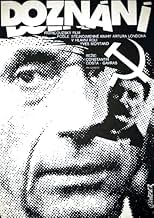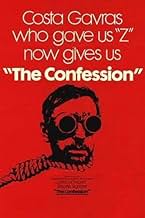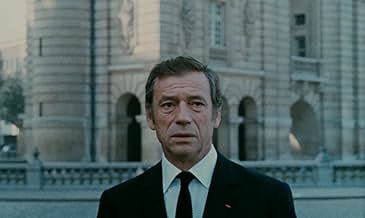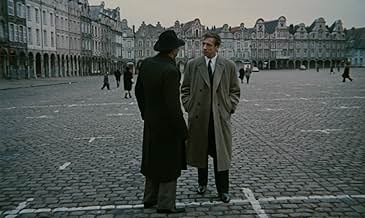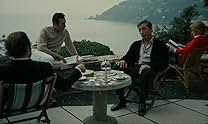L'aveu
- 1970
- Tous publics
- 2h 19min
NOTE IMDb
7,8/10
5,1 k
MA NOTE
Inspiré de l'histoire du communiste Artur London, Anton Ludvik est vice-ministre des Affaires étrangères de la Tchécoslovaquie. Il est arrêté et subira pendant l'enquête des tortures mentale... Tout lireInspiré de l'histoire du communiste Artur London, Anton Ludvik est vice-ministre des Affaires étrangères de la Tchécoslovaquie. Il est arrêté et subira pendant l'enquête des tortures mentales pour qu'il avoue sa trahison.Inspiré de l'histoire du communiste Artur London, Anton Ludvik est vice-ministre des Affaires étrangères de la Tchécoslovaquie. Il est arrêté et subira pendant l'enquête des tortures mentales pour qu'il avoue sa trahison.
- Réalisation
- Scénario
- Casting principal
- Nomination aux 1 BAFTA Award
- 3 victoires et 3 nominations au total
Avis à la une
Anton Ludvik, aka Gerard, is vice-minister of Foreign Affairs of Czechoslovakia. He realizes he is watched and followed. One day, he is arrested and put into jail, in solitary confinement. Will be shown the mental tortures during the investigations and how a faithful top-ranking civil servant is made to confess to treason.
A French political thriller based on a real story in Czechoslovakia? Wow! This actually makes a lot of sense. The Czech people do not have many stories told about them, but they do happen to live in an unfortunate area, sandwiched between Germany and Russia. And, as we know, throughout the 20th Century, those two nations liked to assert their influence on the neighbors.
It is so great to see the story here of a man who stood against the Nazis now having to fight back against the politicians he helped support (sort of).
A French political thriller based on a real story in Czechoslovakia? Wow! This actually makes a lot of sense. The Czech people do not have many stories told about them, but they do happen to live in an unfortunate area, sandwiched between Germany and Russia. And, as we know, throughout the 20th Century, those two nations liked to assert their influence on the neighbors.
It is so great to see the story here of a man who stood against the Nazis now having to fight back against the politicians he helped support (sort of).
I got dragged into this movie like the protagonist got dragged into the brutal, endless interrogation. Given the overall vapidity of most of today's films, this is a real diversion into the power that really lies beneath the surface of movies, the acting, the writing, directing, and most important the mood. The mood of this film drags you like it does the character played by Yves Montand, as he endures a two year interrogation by the people's republic. It's real historic as well, full of details about Titoists, Trotskyites, and anarchists and paranoia over the struggle to control the communist revolution. But Montand looks great as he endures an impressive variety of interrogation techniques.
"The Confession" is an uber-bleak film that stars Yves Montand as a loyal member of the Communist party who is turned on and made a scapegoat of when the party becomes paranoid about informers. He is imprisoned and systematically tortured until he admits to crimes against the party he didn't actually commit. Simone Signoret has a much smaller role as his wife, who sees her home invaded by Communist party thugs during the time in which her husband is in prison.
"The Confession" I think provides a good illustration of the pitfalls of Communism, which, despite its merits on paper, rarely works as an actual system. Those who adhere to it feel too persecuted to remain secure for long, and they turn against each other, convinced of double crossings and disloyalty to the party. It reminded me very much of the excellent novel "Darkness at Noon," which similarly examines the ways in which Communism eventually falls apart in practice.
I can't say I necessarily enjoyed "The Confession." It's extremely one-note; the film doesn't really have much of a dramatic arc. It's not able to marry the qualities of political expose and thriller the way another of director Costa-Gavras's classics, "Z," is. But I would still recommend it.
Grade: B+
"The Confession" I think provides a good illustration of the pitfalls of Communism, which, despite its merits on paper, rarely works as an actual system. Those who adhere to it feel too persecuted to remain secure for long, and they turn against each other, convinced of double crossings and disloyalty to the party. It reminded me very much of the excellent novel "Darkness at Noon," which similarly examines the ways in which Communism eventually falls apart in practice.
I can't say I necessarily enjoyed "The Confession." It's extremely one-note; the film doesn't really have much of a dramatic arc. It's not able to marry the qualities of political expose and thriller the way another of director Costa-Gavras's classics, "Z," is. But I would still recommend it.
Grade: B+
I saw it as a Eastern viewer, knowing , directly, few crumbs of the last decade of Ceausescu regime. I saw it, too, as History teacher. And as one of familiars with the universe of Costa Gavras cinematographic work. It is a pure masterpiece , first for the high dose of truth. Second, for acting. Not the last, for the final part . In essence a try of exorcism. Brutal, honest, precise. Maybe useful.
Anton Ludvik aka Gerard (Yves Montand) is the vice-minister of Foreign Affairs of Czechoslovakia. He is worried that he's being followed. Other officials are being picked up in a purge. He gets picked up by a dark militaristic organization. His family is harassed. His wife Londonova (Simone Signoret) struggles in her new circumstances. He is psychologically tortured to give false confessions.
This is basically two hours of movie confinement with his jailers doing all kinds of psychological warfare. At times, I feel like being tortured myself. There's good and bad in that. It doesn't make for a pleasant or necessarily a compelling viewing experience. It's more of a compelling academic exercise. This is the cinematic equivalent of stress position. The acting is impeccable and the production is first rate. It's Kafkaesque and a cry against totalitarianism.
This is basically two hours of movie confinement with his jailers doing all kinds of psychological warfare. At times, I feel like being tortured myself. There's good and bad in that. It doesn't make for a pleasant or necessarily a compelling viewing experience. It's more of a compelling academic exercise. This is the cinematic equivalent of stress position. The acting is impeccable and the production is first rate. It's Kafkaesque and a cry against totalitarianism.
Le saviez-vous
- AnecdotesThe film was restored in 2014 by KG Productions with the support of the CNC under the supervision of Costa-Gavras by Éclair Group for the image and L.E. Diapason for the sound.
- ConnexionsEdited into Le tombeau d'Alexandre (1993)
- Bandes originalesL'Aveu (Générique)
Written by Giovanni Fusco
Meilleurs choix
Connectez-vous pour évaluer et suivre la liste de favoris afin de recevoir des recommandations personnalisées
- How long is The Confession?Alimenté par Alexa
Détails
- Date de sortie
- Pays d’origine
- Langues
- Aussi connu sous le nom de
- The Confession
- Lieux de tournage
- Grand Place, Arras, Pas-de-Calais, France(London seeing Kahoutek for the last time)
- Sociétés de production
- Voir plus de crédits d'entreprise sur IMDbPro
Box-office
- Montant brut aux États-Unis et au Canada
- 329 954 $US
Contribuer à cette page
Suggérer une modification ou ajouter du contenu manquant

